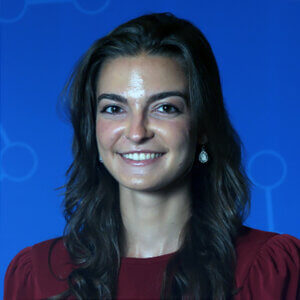 Nicole Sivetz ‘19 is currently a Ph.D. Student in Cold Spring Harbor Laboratory’s School of Biological Sciences.
Nicole Sivetz ‘19 is currently a Ph.D. Student in Cold Spring Harbor Laboratory’s School of Biological Sciences.
What are you working on now?
I’m entering my third year as a Ph.D. student at Cold Spring Harbor Laboratory’s School of Biological Sciences. After completing the majority of my coursework, research rotations and qualifying exam, I decided to join the laboratory of Dr. Mikala Egeblad to conduct my thesis research and pursue further training in cancer biology.
My current project is investigating how inflammation caused by surgical resection of primary pancreatic cancer changes the local tissue microenvironment in the liver to promote metastasis. What’s most exciting about my current role is that I get to work at the leading edge of where basic scientific discoveries are made. I enjoy coming into work each day to design and execute experiments that bring my very own hypotheses to life.
My day-to-day activities are incredibly diverse, so I’m always doing something new like meeting other scientists at research conferences, learning techniques from my lab mates, and taking what I learn from the literature to optimize my work in mouse models and tissue culture. I’m also enjoying the process of gaining more confidence in how I guide my research project and interpret the findings of other scientists, which I know to be critical skills that will help me succeed in any career path after completing my degree.
How did your education at Monmouth University (MU) prepare you to be successful in your chosen field?
My transition from MU to graduate school was virtually seamless with regards to my ability to excel in coursework and effectively communicate science. I quickly realized that the courses I completed to satisfy my major undergraduate requirements really helped me establish a broad yet solid foundation in most scientific subjects, so I was able to immediately dive into the more advanced concepts of my Ph.D. without worrying about catching up with my classmates.
I especially found the discussion-based portions of my courses where I dissected case studies or papers with classmates and professors to be excellent preparation. For example, as part of my Biology Senior Seminar with Dr. Rhoads I gave a presentation examining the scientific credibility of a clickbait article written for a non-scientific audience. This exercise is actually something that I now do very often when interpreting the findings of other scientists in the context of previous literature from my field. I’m also very grateful to have had hands-on experience working at the bench through the lab components of my undergraduate classes, participating in the Summer Research Program, and presenting posters for the Annual School of Science Student Research Conference.
Why was MU right for you?
Back when I was still figuring out where to attend college, a MU alumnus recommended I contact the previous Dean of the School of Science, Dr. Palladino. Dr. Palladino not only kindly answered all of my questions, but he also invited me to come visit the Edison Science Building and sit in on one of his lectures. While sitting there in his classroom, it became very clear to me that MU was a very unique place where students received a tailored education in a supportive learning environment through close mentorship from their professors. This was incredibly appealing to me because I knew MU would be the right place where I could really make my undergraduate experience unique to meet my needs and my aspirations for a career after college.
